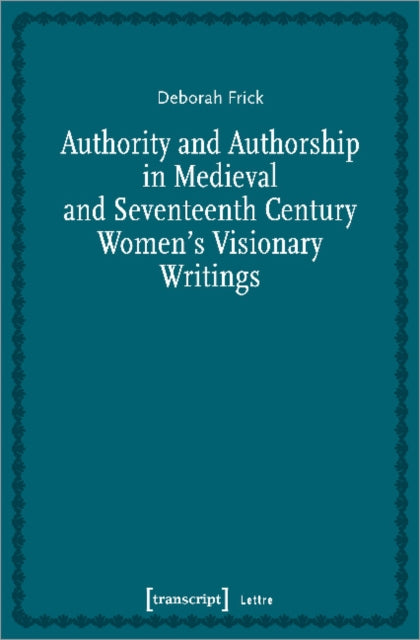Deborah Frick
Authority and Authorship in Medieval and Seventeenth Century Women's Visionary Writings
Authority and Authorship in Medieval and Seventeenth Century Women's Visionary Writings
YOU SAVE £7.02
- Condition: Brand new
- UK Delivery times: Usually arrives within 2 - 3 working days
- UK Shipping: Fee starts at £2.39. Subject to product weight & dimension
Bulk ordering. Want 15 or more copies? Get a personalised quote and bigger discounts. Learn more about bulk orders.
Couldn't load pickup availability
- More about Authority and Authorship in Medieval and Seventeenth Century Women's Visionary Writings
Female visionary writers of the medieval and early modern periods used prophecy to express their concerns and ideas, challenging cultural restrictions and stereotypes. Deborah Frick's book compares medieval visionary writings by Julian of Norwich and Margery Kempe to seventeenth-century visionary writings by Anna Trapnel, Mary Carey, Anne Wentworth, and Katherine Chidley to explore how these women authorized themselves and found a voice and place in their writings. The comparison reveals similar topoi used by the female visionaries, which questions authority, authorship, voice and body images, and breaks down preconceived boundaries and definitions.
Format: Paperback / softback
Length: 156 pages
Publication date: 04 April 2022
Publisher: Transcript Verlag
In the captivating realms of medieval and early modern times, a remarkable phenomenon emerged: female visionary writers took up the mantle of prophecy to express their fears, hopes, and profound insights, defying the constraints of cultural norms and disparaging stereotypes. Within the pages of this captivating book, Deborah Frick delves into the rich tapestry of medieval visionary writings, drawing comparisons with the visionary works of seventeenth-century authors such as Anna Trapnel, Mary Carey, Anne Wentworth, and Katherine Chidley. Through this insightful analysis, Frick explores the profound ways in which these women authored themselves, employing a diverse range of topoi to forge a unique voice and establish a place of their own within the literary landscape.
This comparative examination, in conjunction with the striking similarities in the topoi employed by these female visionaries, presents an opportunity to delve into profound themes such as authority, authorship, the portrayal of voice and body, and the dismantling of preconceived boundaries and definitions. It is a testament to the resilience and creativity of these women, who, through their visionary writings, challenged the societal norms of their time and left an indelible mark on the literary world.
In the chapters that follow, Frick guides us through a meticulous exploration of the writings of Julian of Norwich, Margery Kempe, and their seventeenth-century counterparts. She highlights the ways in which these women employed various literary devices, such as metaphor, symbolism, and allegory, to convey their messages and establish a connection with their readers. Through their visionary experiences, they sought to transcend the limitations imposed upon them by societal norms and forge a path to self-discovery and empowerment.
The book also sheds light on the historical context in which these visionary writings emerged. During the medieval period, women were often marginalized and confined to the domestic sphere, with limited opportunities for education and intellectual pursuits. However, a select few women, such as Julian of Norwich and Margery Kempe, defied these societal expectations and emerged as powerful and influential figures in their own right. Their visionary experiences and writings provided a means for them to express their thoughts, fears, and aspirations, challenging the dominant male-dominated narrative and paving the way for future generations of women writers.
Seventeenth-century visionary writings, on the other hand, witnessed a different landscape. With the rise of the Protestant Reformation and the increasing emphasis on individualism and personal experience, women were afforded greater opportunities to express their thoughts and ideas. Authors such as Anna Trapnel, Mary Carey, Anne Wentworth, and Katherine Chidley emerged as prominent figures in the visionary tradition, using their writings to explore themes of spirituality, gender roles, and the nature of reality.
Frick's analysis of these visionary writings is insightful and nuanced, drawing upon a wealth of scholarship and critical analysis. She skillfully weaves together historical, literary, and cultural perspectives to provide a comprehensive understanding of the role of female visionary writers in medieval and early modern times. The book offers valuable insights into the power of literature to challenge societal norms, empower women, and promote a deeper understanding of the human experience.
In conclusion, this book is a must-read for anyone interested in medieval and early modern literature, gender studies, and the power of visionary writing to transcend boundaries and challenge preconceived notions. Deborah Frick's meticulous research and engaging writing style make this a captivating and thought-provoking exploration of the lives and works of female visionary writers. Through their visionary experiences, these women not only found a voice for themselves but also left a lasting legacy that continues to inspire and empower readers today.
Weight: 666g
Dimension: 226 x 147 x 15 (mm)
ISBN-13: 9783837656893
This item can be found in:
UK and International shipping information
UK and International shipping information
UK Delivery and returns information:
- Delivery within 2 - 3 days when ordering in the UK.
- Shipping fee for UK customers from £2.39. Fully tracked shipping service available.
- Returns policy: Return within 30 days of receipt for full refund.
International deliveries:
Shulph Ink now ships to Australia, Belgium, Canada, France, Germany, Ireland, Italy, India, Luxembourg Saudi Arabia, Singapore, Spain, Netherlands, New Zealand, United Arab Emirates, United States of America.
- Delivery times: within 5 - 10 days for international orders.
- Shipping fee: charges vary for overseas orders. Only tracked services are available for most international orders. Some countries have untracked shipping options.
- Customs charges: If ordering to addresses outside the United Kingdom, you may or may not incur additional customs and duties fees during local delivery.


